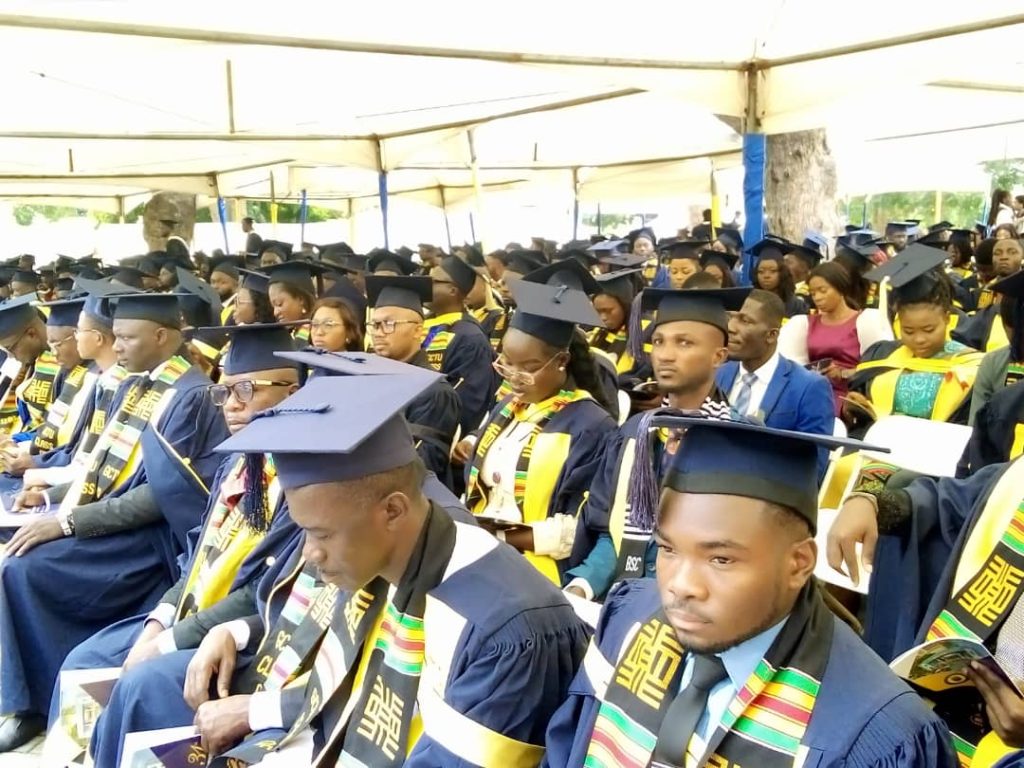By Benjamin A. Commey/Stanley Senya
Accra, July 30, GNA – A total of 1,147 students, over the weekend, graduated with PhDs and other degrees from the Ghana Communication Technology University (GCTU), in Accra.
The graduating class of the 2021/22 academic year, comprised seven PhDs, 103 master’s degrees and 1,037 undergraduate degrees and diplomas.
Some 668 of the graduands made up of 110 postgraduate students and 558 undergraduate students, were from affiliated universities, including the Kwame Nkrumah University of Science and Technology (KNUST), Coventry University (United Kingdom) and CASS Europe.
The PhDs were conferred on the seven by the CASS Institute of Management, France, and the master’s degree by the Coventry University, Anhalt University of Applied Sciences, Germany and the KNUST.
Ms Sussana Frimpong, who graduated with BSc. degree in Business Administration (Accounting option), was the valedictorian, with a cumulative weighted average of 75.65.
Speaking at the 31st congregation ceremony, Professor Emmanuel Ohene Afoakwa, Vice-Chancellor of the University, said the University had played a critical role in shaping the landscape of education in the country since attaining the status of public university three years ago.
The unwavering dedication and hard work of faculty and staff, he said, had pushed GCTU to heights of excellence over the years.
“Today, we proudly celebrate the graduation of our 31st batch of graduates, which is evidence of the progress and growth of our university.
Each batch of graduates represents a step in the development of our institution, and we are honoured to have played a part in shaping the future of these remarkable individuals,” he stressed.
Granted public university status through an Act of Parliament, in 2020, the GCTU is mandated to train students in the fields of technology and engineering.
Prof Afoakwa said the vision of the GCTU was to create a technology hub akin to the prestigious Silicon Valley of America.
To achieve that, he said, the faculty was being strengthened and equipped with state-of-the-art equipment, including cutting-edge laboratories, research centres, and libraries, to provide students with the best of training.
Construction of additional high-rise buildings was underway to provide office accommodation, lecture rooms and hostel facilities for the more than 6,500 student population.
Additionally, he said, lecture rooms on its main campus and the business school, had been equipped with modern teaching and learning aids such as projectors and lecterns, to enhance interactivity of teaching and learning.
“We also took delivery of 550 tables and chairs in April to provide comfort for students in lecture rooms,” he said, adding that, an additional consignment of 800 was expected in the coming days.
On the partnership, the Vice-Chancellor said the University had signed a number of memorandum of understanding with reputable organisations to provide students with opportunities for internships, national service placements and future employment
“These partnerships bridge the gap between academia and industry, equipping our students with practical skills and experiences that enhance their professional growth and employability,” he said.

He encouraged the graduands to embrace new technological ideas to enhance their marketability in the job market and broaden their horizons in Ghana, adding that, the University had equipped them with the skills and knowledge needed to thrive in a rapidly changing world.
“Embrace every opportunity that comes your way, and let your light shine brightly wherever you go,” he urged.
The Vice-Chancellor also assured that the University would continue to drive innovation, excellence and transformation in education and technology, and make a positive impact in Ghana and beyond.
Mr Samuel Dubik Mahama, Managing Director, Electricity Company of Ghana, urged the graduands to use the acquired knowledge in ICT wisely to solve societal problems.
He also tasked them to focus on job creation to enable them to employ others and help reduce the country’s unemployment rate, instead of relying on already established companies for employment.
GNA